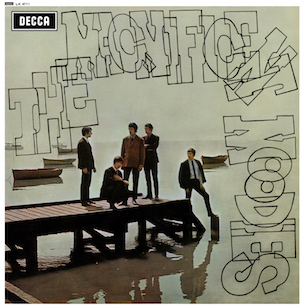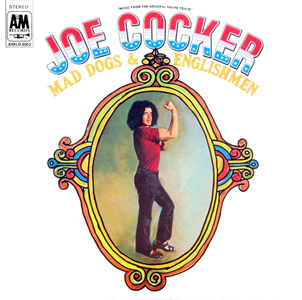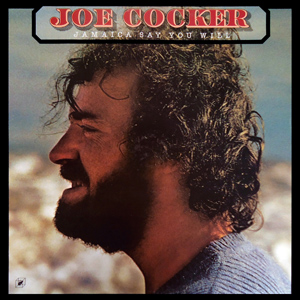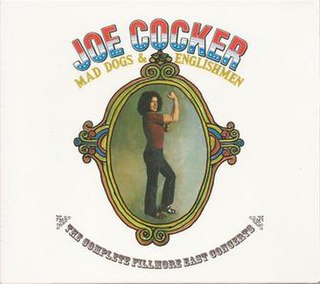
John Robert "Joe" Cocker was an English singer known for his gritty, bluesy voice and dynamic stage performances that featured expressive body movements. Most of his best known singles, such as "Feelin' Alright?" and "Unchain My Heart", were recordings of songs written by other song writers, though he composed a number of songs for most of his albums as well, often in conjunction with songwriting partner Chris Stainton.

"With a Little Help from My Friends" is a song by the English rock band the Beatles, from their 1967 album Sgt. Pepper's Lonely Hearts Club Band. It was written by John Lennon and Paul McCartney and sung by drummer Ringo Starr, his lead vocal for the album. As the second track on the album, it segues from the applause on the title track.

The Magnificent Moodies is the 1965 debut album by British rock band The Moody Blues, released on Decca Records. It is the only album by the original line-up of Denny Laine (guitar/vocals), Clint Warwick (bass/vocals), Mike Pinder (keyboards/vocals), Ray Thomas (flute/harmonica/percussion/vocals) and Graeme Edge (drums). Lead vocals were shared by Laine, Pinder and Thomas. The album is a mix of rhythm and blues covers, including "Go Now" which had been a Number 1 hit single for the band earlier that year, and original songs by Laine and Pinder which show more of a Merseybeat influence. Also included is a cover of the George and Ira Gershwin standard "It Ain't Necessarily So". The album was produced by Denny Cordell, with the exception of "Go Now" which was produced by Alex Wharton. In-between "Go Now" and The Magnificent Moodies the band had released two more singles, "I Don't Want to Go On Without You" and "From the Bottom of My Heart", neither of which were included on the album. For the American and Canadian release on London Records, with the title Go Now: The Moody Blues #1, four songs were replaced with those two preceding singles and two B-sides, with a different running order of the tracks. One of the tracks that was replaced, "Stop", was released as a single in America and Canada later that year. The American and Canadian album also titled three of the songs incorrectly.

The Monkees Present is The Monkees' eighth album. It is the second Monkees album released after the departure of Peter Tork and the last to feature Michael Nesmith until 1996's Justus.

Shine On Brightly is the second studio album by English rock band Procol Harum, released in 1968 by record labels Regal Zonophone and A&M.

Gentle Giant is the first album by British progressive rock band Gentle Giant, released in 1970.

Mad Dogs & Englishmen is a live album by Joe Cocker, released in 1970. The album's title is drawn from the 1931 Noël Coward song of the same name and Leon Russell's "Ballad of Mad Dogs and Englishmen". Only four songs of the 16 on the original album were drawn from his first two studio albums. Besides the contributions of bandmate and musical director Leon Russell, it draws equally from rock and soul. Accompanying Cocker is a choir, a three-piece horn section and several drummers.

Joe Cocker! is the second studio album by English singer Joe Cocker, released in November 1969. Following the template of his first LP, the album features numerous covers of songs originally performed by Bob Dylan, the Beatles, Leonard Cohen, and future touring partner Leon Russell. Cocker also co-wrote one song, "That's Your Business Now", with Chris Stainton, who was a frequent songwriting partner.

Thirds is the third studio album by the American rock band James Gang. The album was released in mid 1971, on the label ABC Records. It is the last studio album featuring Joe Walsh. "Walk Away" was released as a single, making the Top 40 on at least one national chart, reaching #51 on the Billboard Hot 100, the best placement of a James Gang single. The album reached Gold status in July 1972.

Cocker is the tenth studio album by Joe Cocker, released in April 1986, his second on Capitol label. It features hit singles "You Can Leave Your Hat On" and "Don't You Love Me Anymore", the first made popular after its use in the famous striptease scene in the film 9½ Weeks. Released as a single, Cocker's version of the song peaked at No. 35 on Billboard Hot Mainstream Rock Tracks. The album also features rendition of Marvin Gaye's "Inner City Blues", a Motown legend's classic lament to urban decay.

Jamaica Say You Will is the fifth studio album by Joe Cocker, released in April 1975. The songs from the album come from the same sessions that produced the highly acclaimed LP I Can Stand A Little Rain (1974). Jamaica Say You Will wasn't, however, as successful as its predecessor. It reached number 42 on the US album charts.

Friends and Legends is the second solo album by Michael Stanley. The album title refers to the backing musicians accompanying Stanley on the album, which was recorded at Applewood Studios in Golden, Colorado. The basic band on all tracks was Barnstorm, composed of Joe Walsh on lead guitar and synthesizer, Joe Vitale on drums, flute, synthesizer and backing vocals, and Kenny Passarelli on bass. In addition, three members of Stephen Stills' Manassas performed: Paul Harris on keyboards, Joe Lala on percussion and Al Perkins on pedal steel guitar, and the band also included saxophonist David Sanborn. Among the backing vocalists were Richie Furay and Dan Fogelberg. In keeping with the collaborative spirit, J. Geils assisted with production of the saxophone tracks.

Hymn for My Soul is the twentieth studio album by Joe Cocker, released in 2007. It was produced by Ethan Johns. Musicians on these special sessions included Tom Petty & The Heartbreakers' Benmont Tench, legendary drummer Jim Keltner, Mike Finnigan, ace guitarist Albert Lee, Dave Palmer, Greg Leisz, James Gadson, Bob Babbitt and Johns. The songs include Cocker's signatures on George Harrison's "Beware of Darkness", Bob Dylan's "Ring Them Bells", John Fogerty's "Long As I Can See The Light" and Stevie Wonder's "You Haven't Done Nothin'".

Joe Cocker is the third studio album by Joe Cocker, released in 1972 in Europe as Something to Say on Cube Records, and in the USA as Joe Cocker on A&M Records. It contains the hit single "High Time We Went", that was released in the summer of 1971. Joe Cocker signalled Cocker's change of direction into a more jazzy, blues style. The album reached no. 30 in the US album charts. However, although it received a positive response from the press, it made no impression on the British and European charts.
"Feelin' Alright?", also known as "Feeling Alright", is a song written by Dave Mason of the English rock band Traffic for their eponymous 1968 album Traffic. It was also released as a single, and failed to chart in both the UK and the US, but it did reach a bubbling under position of #123 on the Billboard Hot 100. Joe Cocker performed a more popular rendition of the song that did chart in the U.S. Both Traffic's and Cocker's versions appear in the 2012 movie Flight. The song had also been featured in the 2000 film Duets, sung by Huey Lewis.

I Can Stand a Little Rain is the fourth studio album by Joe Cocker, released in August 1974, and considered to be the singer's finest album in that decade.

Organic is the fifteenth studio album by Joe Cocker, released on 14 October 1996 in the UK.

Hard Knocks is the twenty-first and penultimate studio album by Joe Cocker, released on 1 October 2010 by Columbia Records in Europe. It features nine new songs produced by Matt Serletic plus Cocker's version of the Dixie Chicks number "I Hope", which was produced by Tony Brown. Apart from a regular CD release, the album was also released on vinyl.

Mad Dogs & Englishmen: The Complete Fillmore East Concerts is a live album by Joe Cocker, recorded in New York City in 1970.
Tim Timebomb is a music project by Tim Armstrong, best known as a member of the punk rock band Rancid. Armstrong has recorded a large number of songs – a mixture of cover versions, including Rancid covers, and original songs, including some tracks from his musical film project RocknNRoll Theater – with a variety of supporting musicians.


















